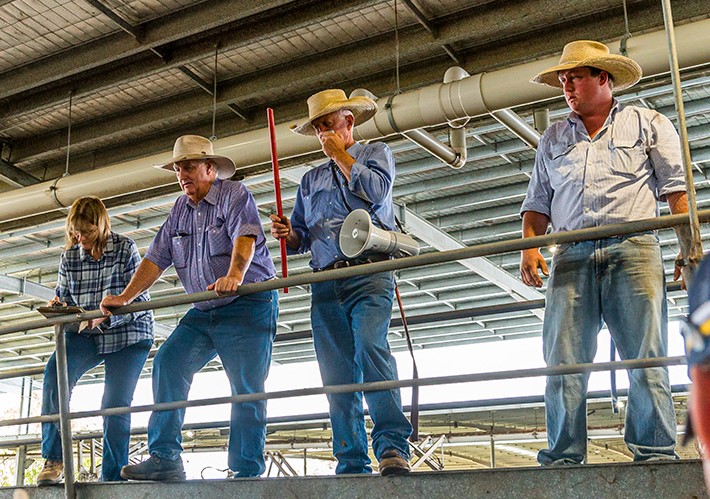
Susanna Freymark
Farmer Roger Bailey said he supported the council’s vision for the Northern Rivers Livestock Exchange, but – there was a but…
“It’s a pity they can’t see their vision without attacking agents,” he said at a public meeting at the Casino RSM Club on Monday, September 4.
The public meeting was organised by business owner Allan Berry to provide a forum about the dispute between council and agents over the new NRLX licence agreement.
About 900 people packed into the RSM auditorium.
The speakers at the meeting were Richmond Valley mayor Robert Mustow, agent Darren Winkler representing the Casino Auctioneers Association Inc (CAAI), Mr Bailey representing farmers and Mr Berry representing businesses.
Former agent and state MP Thomas George conducted the meeting.
Several times, Mr George had to call Order as people booed or heckled.
There was a lot of emotion in the room.
Mr George said he was concerned about the negative publicity and the impact the dispute was having on the industry.
“I was shocked to learn one of the agents was rejected, with no recourse,” he said.
That rejected agent was Ian Weir & Sons.
Mr Winkler mentioned Ian Weir & Sons as well.
During council’s licence agreement process, Weirs were rejected.
“They’ve been selling for 14 years at the NRLX,” Mr Winkler said.
“Why?” someone in the audience shouted. The question was not answered.
That was only one of the issues.

There was the increase in fees, the handling of livestock and the lack of consultation that Mr Winkler said agents objected to in the new licence agreement.
Mayor Robert Mustow was the first speaker at the meeting.
“It’s important to get the facts about this issue,” Mr Mustow said.
Part of the reason for the new licence agreement was to address animal welfare costs.
“There have been serious incidents at NRLX, some requiring police,” he said.
“All the incidents have been documented.
“Council has a duty to ensure safety.”
Council will appoint an animal welfare officer, Mr Mustow said.
The animal welfare issue is the biggest sticking point of the NRLX new licence agreement – more than the increase in agents’ fees.
Mr Winkler said it was the only part of the agreement that was non-negotiable.
“CAAI must remain the main provider of livestock handling post and pre-delivery, he said.
Mr Winkler said, “the RSPCA had orders on the saleyards regarding the supply of clean water”.
Council has said there were 33 reported welfare incidents relating to CAAI staff.
Agent Matthew McCormack stood up at the end of the meeting and wanted it noted that what was said about the way agents handled the livestock was “misleading”. His voice was shaky when he spoke.
Council wants to use its own livestock team to move and handle the cattle once they were sold.

Mr Winkler spoke about the costs and the consultation process.
“Auctioneers’ response to delivery of cattle from the time the trucks arrive is $4.80 a head.”
Council wants to do it for $8.80 a head, he said.
Mr Winkler questioned council’s selection of saleyards to compare the NRLX to in their pricing structure.
He wanted to know why Dubbo and Gunnedah saleyards – which are council-owned and operated – were not used as a more valid comparison.
Council wants the new NRLX fees to include a change to the Agent Business Usage fee from a fixed per head of cattle charge to 0.2% of gross revenue. This would be $2 for every $1000 of livestock sold. Council wants this to be paid by the agents from their revenue of $45–$55 from each $1000 (agent commissions vary from 4.5–5.5%), according to the council.
Mr Winkler claims the council insisted agents acted individually not as a collective during the consultation process of the licence agreement.
He ended his talk ended with three points.
1. We want to negotiate. We want to go back.
2. Stick with the old agreement until we can get a new one.
3. That CAAI remain the livestock handler.
The crowd clapped.

Allan Berry was the next speaker.
“The saleyard is more than a place where people sell cattle, it is a place where farmers lean over the rail and talk about how dry it is or the price of cattle,” Mr Berry said.
“It’s a mental health day.
“I don’t know what value you put on that.’
Mr Berry’s main concern was that Wednesdays had gone from the “busiest day of the week to the quietest day of the week”.
It’s not good for Casino, he said.
“Every time the cattle truck rolls through Lismore, my business rolls with it,” Mr Berry said.
“Every ratepayer is being punished for this.”
There were questions, tears, anger and other emotions during the meeting.
Each speaker said a lot more than is reported here. The meeting went for an hour and a half.
At the end of the meeting four motions were put forward by the audience. Read about that here.
Mr George said the night was not about “who is right and who is wrong”.
“This is about getting the saleyards open,” he said.
CAAI president Andrew Summerville spoke briefly.
“From our perspective, everything is negotiable,” Mr Summerville said.
“We want cattle in Casino and we want to do it.”
And that is what everyone wants – the cattle back in Casino at the NRLX.
What happens next? That depends on the council and agents.



